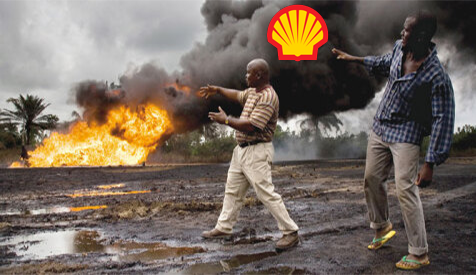Call to Halt Shell’s Sale of SPDC in the Niger Delta: A Petition in Support of Pollution Affected Communities
Attention:
President Bola Tinubu, Minister of Petroleum Resources
Sen. Heineken Lokpobiri, Minister of State, Petroleum Resources (Oil)
Hon. Ekperipe Ekpo, Minister of State, Petroleum Resources (Gas)
Commission Chief Executive, Nigerian Upstream Petroleum Regulatory Commission
To Whom It May Concern,
We, the undersigned community leaders, national and international organisations, academic scholars and concerned individuals, are compelled to address the critical issue of Shell’s divestment from The Shell Petroleum Development Company of Nigeria Limited (SPDC). This divestment, which entails Shell’s withdrawal from its Nigerian onshore operations by transferring its interests to Renaissance —a consortium comprising various Nigerian and international energy entities—demands an immediate halt to enable careful scrutiny given the historical and ongoing challenges in the Niger Delta region.
The legacy of SPDC’s operations in the Niger Delta is deeply troubling, marked by significant environmental degradation, human rights violations, and unresolved grievances among local communities. As detailed in the recent report by a team of international experts – the Bayelsa State Oil and Environment Commission, the Niger Delta region faces monumental health crises due to oil and gas pollution by companies like Shell. Contamination from total petroleum hydrocarbons (TPHs) and heavy metals (HMs) has led to high levels of toxins in water, soil, and air, significantly impacting public health. These contaminants have infiltrated the food chain, exposing residents to carcinogenic substances, which exacerbate health issues and contribute to a public health emergency. The United Nations Environment Programme’s Environmental Assessment of Ogoniland report detailed similar findings.
In its current form, and without addressing Shell’s environmental and social legacies in the Niger Delta, the divestment plan risks perpetuating these issues, further entrenching the cycles of pollution, disenfranchisement, and conflict that have long plagued the region.
Urgent Call for a Halt to Divestment
We unequivocally call for an immediate halt to Shell’s divestment from SPDC until a comprehensive, transparent, and inclusive framework is established. This framework must ensure that all environmental and social liabilities are fully addressed to the satisfaction of all affected communities. The process must include clear commitments to environmental remediation, fair community compensation, and the establishment of robust regulatory oversight to prevent future abuses.
Demand for Comprehensive Resolution of Environmental and Social Liabilities
The divestment raises significant concerns regarding the accountability for SPDC’s historical environmental damages and the ongoing pollution resulting from oil operations. The asset ownership transition must not diminish local communities’ capacity to seek redress and justice. The distressing experiences of communities such as Oloibiri, Nembe, Umuechem, Ogoniland, Rumuekpe and others underscore the urgent need for a divestment process that prioritises environmental restoration and social equity.
Strengthening Regulatory Oversight
We emphasise the critical role of regulatory bodies in ensuring stringent compliance with environmental and social standards, as outlined in the Nigerian Petroleum Industry Act 2021. The regulatory framework must be rigorously enforced to safeguard the rights and well-being of the Niger Delta communities during and after the divestment process.
Ensuring Community Engagement and Fair Compensation
It is imperative that any divestment process incorporates meaningful engagement with the affected communities, ensuring their voices are heard and their concerns are addressed. Fair compensation and clear remediation commitments must be integral to any divestment agreement.
Rigorous Assessment of New Operators
We urge the Nigerian regulatory authorities to conduct a thorough assessment of the Renaissance consortium’s technical and financial capabilities to manage the environmental challenges in the Niger Delta responsibly. The assessment must include detailed plans for spill prevention, emergency response, and environmental restoration.
Proposal for an Environmental Restoration Fund
We propose the creation of an Environmental Restoration Fund, with contributions from Shell. This fund should focus on environmental restoration and community development projects in the Niger Delta, with transparent management and active community participation.
Recommendation for National Principles for Responsible Petroleum Industry Divestment
We recommend that the Federal Government of Nigeria (FGN) agree upon the attached guidelines termed the National Principles for Responsible Petroleum Industry Divestment, which have been prepared and validated by a cross-section of academics, civil society and community interest groups, before approving any divestment plans. These principles should mandate (in addition to the above points):
Informed, Transparent, and Inclusive Decision-Making: Ensure all divestment applications are publicly announced with sufficient notice, involving authentic engagement and written consent from host communities, local, and state governments, adhering to Free Prior and Informed Consent (FPIC) standards.
Full Disclosure of Environmental Liabilities: Obligate sellers to inform buyers and the public about all existing environmental liabilities within the divestment area, ensuring transparency and accountability.
Comprehensive Environmental and Social Evaluations: Mandate the inclusion of Environmental Evaluation Reports (EER), Environmental, Social, and Health Impact Assessments (ESHIA), and Environmental and Social Due Diligence Studies (ESDD) in divestment applications.
Asset Integrity Review: Conduct thorough third-party reviews of all assets to be divested, addressing any integrity or safety issues prior to sale approval.
Remediation and Financial Liabilities: Ensure all environmental damages and financial liabilities are fully addressed before considering divestment applications, with an Environmental Bond posted by the seller to cover undisclosed damages.
Local Content and Community Engagement: Require buyers to demonstrate compliance with local content guidelines and outline plans for ensuring community benefits and engagement.
Gas Flaring and Decommissioning Plans: Include plans to end gas flaring and fully fund decommissioning and abandonment processes.
Carbon Emissions Accounting: Account for all carbon emissions associated with the divested assets and propose mitigation or offset plans.
Community Profit Sharing: Offer host communities the opportunity to receive an interest in any new joint venture agreements post-divestment.
Conclusion
Shell’s attempt to divest from SPDC presents a critical juncture for addressing the longstanding environmental and social challenges in the Niger Delta. We implore the Nigerian authorities to halt the planned divestment and ensure a just, sustainable, and equitable future for the affected communities.
We anticipate your prompt and constructive response, signalling a commitment to rectifying past injustices and fostering a harmonious future for the Niger Delta.
Cc:
The Presidency, Federal Republic of Nigeria
Federal Ministry of Petroleum Resources, Nigeria
Federal Ministry of Environment, Nigeria
Nigerian Upstream Regulatory Commission
State Governments in the Niger Delta
Shell Global
Renaissance Consortium
International Environmental and Human Rights Organisations





